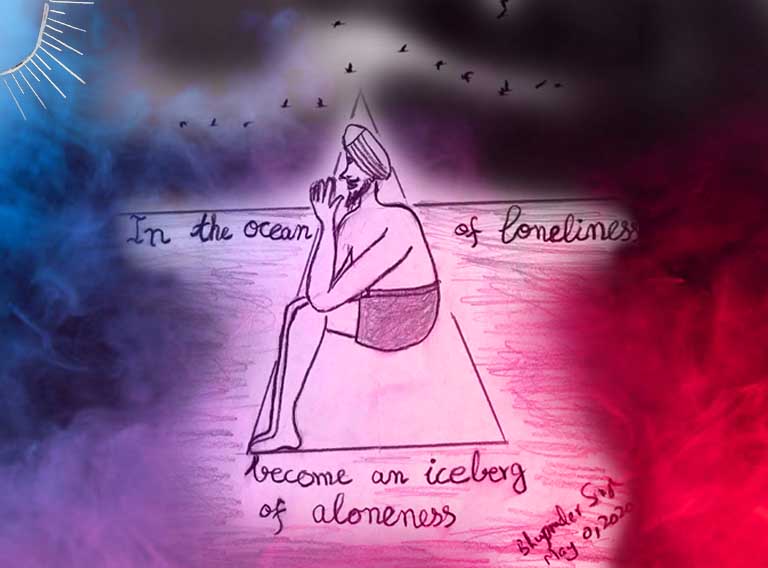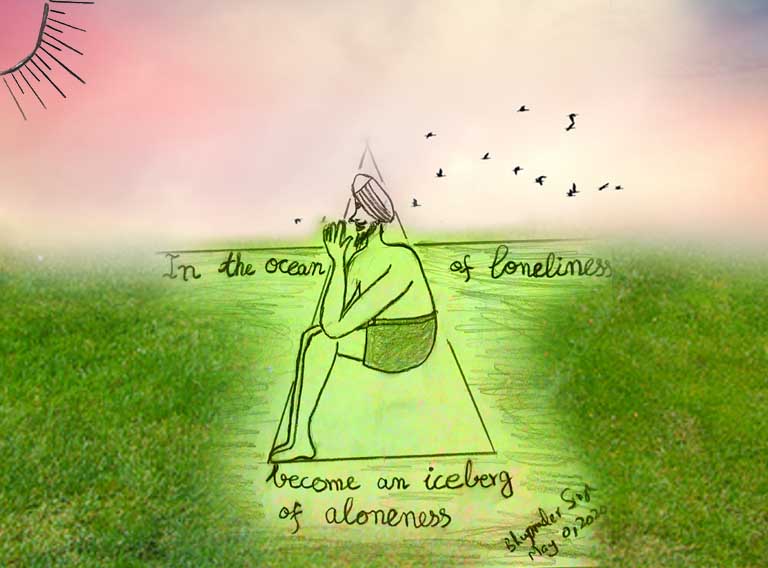Conquering solitude with ‘great resetting of lives’ in Coronavirus times
![Ever since the spread of Coronavirus, its reverberations have been felt in the entire world as it has resulted in lockdowns, social distancing and quarantine in extreme cases. The result is we are missing the ability to visit, converse with, hug, go out, travel or spend time with dear and near ones by socializing and starting feeling lonely. Houston-based author Bhupinder Singh lays down ground rules to conquer solitude through Gurbani, prayer, meditation, determination and innovation. HUMANS ARE SOCIAL CREATURES […]](https://www.theworldsikhnews.com/wp-content/uploads/2020/05/Lonlyness-slider-3-360x266.jpg)
Ever since the spread of Coronavirus, its reverberations have been felt in the entire world as it has resulted in lockdowns, social distancing and quarantine in extreme cases. The result is we are missing the ability to visit, converse with, hug, go out, travel or spend time with dear and near ones by socializing and starting feeling lonely. Houston-based author Bhupinder Singh lays down ground rules to conquer solitude through Gurbani, prayer, meditation, determination and innovation.
HUMANS ARE SOCIAL CREATURES WITH AN INBUILT YEARNING TO CONNECT WITH OTHERS. All of a sudden, life has become shallower, like living in a survival mode than living normally as we are accustomed to. As the new pathogen forces us to socially distance, we all as a society have started showing signs of its impact.
The first sign is we are feeling anxious and frustrated, in the comforts of our own house. Already, it has been reported that there has been a significant upswing in domestic violence because of lockdown. The loneliness is being experienced on a scale as never before, and it can produce unfavourable outcomes for both physical and mental health.
Predictions are that this loneliness is going to leave lasting scars. The toll on the masses’ mental and emotional wellbeing will be researched and documented later in the years to come. Psychologists have established that the perception of social isolation – loneliness, impacts the brain and behaviour and is a risk factor for morbidity and mortality. Psychological studies have shown that the perception of loneliness actually hurts more than being physically alone.
Physically alone is not necessarily loneliness, if there is a connection with the inner self. A person can be alone and yet not feeling lonely.
Physically alone is not necessarily loneliness, if there is a connection with the inner self. A person can be alone and yet not feeling lonely. But there is another aspect of being alone, connected with the inner self without the negative feeling of being lonely. Being alone can provide the connection that loneliness yearns for. It forces us to go deeper within, to know ourselves better and to search and explore techniques to respond positively to loneliness. This solitude could be inspiring, invigorating and nurturing.

There is a body of literature from poets, artists and authors where they have praised it as a catalyst for their own creativity. It can even evolve us higher, giving rise to a feeling of being connected with Almighty, when one is all by self. There are many who feel loneliness, even while they are in the midst of the company where they don’t fit in, or are brooding over their insecurities. Both of these scenarios have a common “I” factor. The aloneness changes that perspective and it is very uplifting and fulfilling.
How are we growing in this new sudden imposed curfew? Maybe we can use it to grow in positivity and learn to shun negativity. For sure, it is easier said than implemented. I am not here preaching but exploring it myself and hope that we can make this journey together.
I can add here about my own struggles, but it is not what this is about. It is about how we can use this as an opportunity to grow individually, as a family, as a community and society. So, the calamity can be the harbinger of change. It can prove to be a ‘Great Resetting’ in our lives. This is our opportunity to explore solitude and use it as a ladder to go down deep within when going out physically is not an option.
This is a lofty pedestal to aim for during these trying times. Spirituality is nurtured in solitude. We can grow from this, become stronger like an iceberg; capable of rising above the sea of loneliness that disrupts life we are accustomed to and have become cosy in it.
The activities leading to it are prayer, meditation, service, reading of scriptures and devotional singing, enabling:
- Peace in aloneness – not needing constant company or emotional support of others. If the urge emanates then we still have a phone, social media and emails, etc.
- Mental peace – the mind becomes calm, usually, the human mind has a tendency to swing on either side like a pendulum, always on the go. Our mind operates by thinking this will work, let us do this. No, don’t do it, will not pan out. But in this state, it is in a neutral position and completely absent are swinging in either direction.
- State of Thankfulness – Cheerful acceptance of all reality as God’s Order –
- Feeling presence of Bliss -say goodbye to frustrations and disappointments and instead feel blissfulness within.
This is a lofty pedestal to aim for during these trying times. Spirituality is nurtured in solitude. We can grow from this, become stronger like an iceberg; capable of rising above the sea of loneliness that disrupts life we are accustomed to and have become cosy in it.
Let this challenge help us to look for blessings in disguise, it will change our outlook to life. Faith, strong conviction, coupled with enthusiasm can become the prime movers of this change. This can bring about loving acceptance of the situation, thankfulness and appreciation.

It is this feeling of the divine presence within, which allowed Guru Nanak to cover over 28000 KMs on foot to give the message of connectivity as children of one God. Guru Ji had tasted aloneness from early childhood. When he started his first Udassi, he camped in Eminabad where Rori Sahib Gurudwara stands and spent over a month in solitude and in meditation. Similarly, when he stopped for extended periods during his Udassis, Guru Ji had solitude time. When Guru Ji came to Achal Batala for meeting with Yogis in 1539, in response to a question by Charpat Yogi, Guru Ji provided the following insight:
ਰਹਹਿ ਇਕਾਂਤਿ ਏਕੋ ਮਨਿ ਵਸਿਆ ਆਸਾ ਮਾਹਿ ਨਿਰਾਸੋ ॥
ਅਗਮੁ ਅਗੋਚਰੁ ਦੇਖਿ ਦਿਖਾਏ ਨਾਨਕੁ ਤਾ ਕਾ ਦਾਸੋ ॥੫॥
One who lives alone, as a hermit, enshrining the One Lord in his mind, remaining unaffected by hope in the midst of hope, sees and inspires others to see the inaccessible, unfathomable Lord. Nanak is his slave. ||5||
–Guru Granth Sahib, page 938
Guru Arjan Dev Ji also endorses this thought process in these words:
ਸੋ ਇਕਾਂਤੀ ਜਿਸੁ ਰਿਦਾ ਥਾਇ॥ ਸੋਈ ਨਿਹਚਲੁ ਸਾਚ ਠਾਇ॥੩॥
He alone is a hermit, whose heart is steady and stable. He alone is steady and unmoving, who has found the true place. ||3||
–Guru Granth Sahib, page 1180
These statements above are based on actual life experiences of our Gurus and are not just hearsay. Guru Jis have thus advocated a life of a hermit in the midst of family, friends, and relatives. They lived the life of a house-holder yet remained detached from it. It was this strength alone that allowed Gurus to face the challenges in life including the sacrifice of their lives.
Guru Teg Bahadur Ji gave a practical demonstration of aloneness by living the life of a hermit, while with the family in Bakala. He spent 20 years in meditation alone in a basement room there. Even if we look at the life of Guru Gobind Singh Ji, we can see that aspect, no matter what his external circumstances were, he was always connected. He extols in these words:
ਰੇ ਮਨ ਐਸੋ ਕਰ ਸੰਨਿਆਸਾ ॥ ਬਨ ਸੇ ਸਦਨ ਸਬੈ ਕਰ ਸਮਝਹੁ ਮਨ ਹੀ ਮਾਹਿ ਉਦਾਸਾ ॥੧॥ ਰਹਾਉ ॥
O mind! let asceticism be practised in this way: Consider your house as the forest and remain unattached within yourself…..Pause.
Dasam Granth, Page 709
After all, the message that Guru Ji taught to his Sikhs, he himself lived it even in trying times. In the midst of Machhiwara forest in 1704, all alone on a rainy winter night, losing everything including his four sons, family and Sikhs including Five Beloved –Panj Pyare, still he was singing:
ਮਿਤ੍ਰ ਪਿਆਰੇ ਨੂੰ ਹਾਲੁ ਮੁਰੀਦਾਂ ਦਾ ਕਹਣਾ॥
ਤੁਧ ਬਿਨੁ ਰੋਗੁ ਰਜਾਈਆਂ ਦਾ ਓਢਣੁ ਨਾਗ ਨਿਵਾਸਾਂ ਦੇ ਰਹਣਾ॥
ਸੂਲ ਸੁਰਾਹੀ ਖੰਜਰੁ ਪਿਯਾਲਾ ਬਿੰਗ ਕਸਾਈਯਾਂ ਦਾ ਸਹਣਾ॥
ਯਾਰੜੇ ਦਾ ਸਾਨੂੰ ਸੱਥਰ ਚੰਗਾ ਭੱਠ ਖੇੜਿਆਂ ਦਾ ਰਹਣਾ॥੧॥੧॥੬॥
Convey to the dear friend the condition of the disciples, Without Thee, the taking over of quilt is like disease and living in the house is like living with serpents The flask is like the spike, the cup is like a dagger and (the separation) is like enduring the chopper of the butchers, The pallet of the beloved Friend is most pleasing and the worldly pleasures are like a hot burning furnace.
Dasam Granth, Page 71
So, there is an inherent strength in aloneness that we can now explore for ourselves especially when the option of being “in the company of” is unavailable. The Punjabi word for aloneness is “ਇਕਾਂਤ”; and the word for loneliness is “ਇਕਲਾ”, and this Corona event has become our initiation for our journey from loneliness to aloneness. Like everything in the world even the loneliness will end with its expiry date, so let us not just succumb to it but face it head-on.
 An engineer by profession, hailing from Myanmar, educated in India, Bhupinder Singh is a Houston-based businessman, with a keen interest in writing books and articles on Sikh history, motivation and spirituality. The books he has written include, Connecting with the Master – A collection of essays on topics related to Sikhism, Gurmat Quotient (GQ) – Book on development of Spirituality, Rehraas – With meaning and commentary in English, Why are We Here? – Become exploring the purpose of human life, Fish Eat Fish World – An Illustrated Children’s book, Humility – A Spiritual Journey, In Bully’s Eyes – An Illustrated Children’s book on Bullying
An engineer by profession, hailing from Myanmar, educated in India, Bhupinder Singh is a Houston-based businessman, with a keen interest in writing books and articles on Sikh history, motivation and spirituality. The books he has written include, Connecting with the Master – A collection of essays on topics related to Sikhism, Gurmat Quotient (GQ) – Book on development of Spirituality, Rehraas – With meaning and commentary in English, Why are We Here? – Become exploring the purpose of human life, Fish Eat Fish World – An Illustrated Children’s book, Humility – A Spiritual Journey, In Bully’s Eyes – An Illustrated Children’s book on Bullying
 Print
Print

 53
53


One thought on “Conquering solitude with ‘great resetting of lives’ in Coronavirus times”